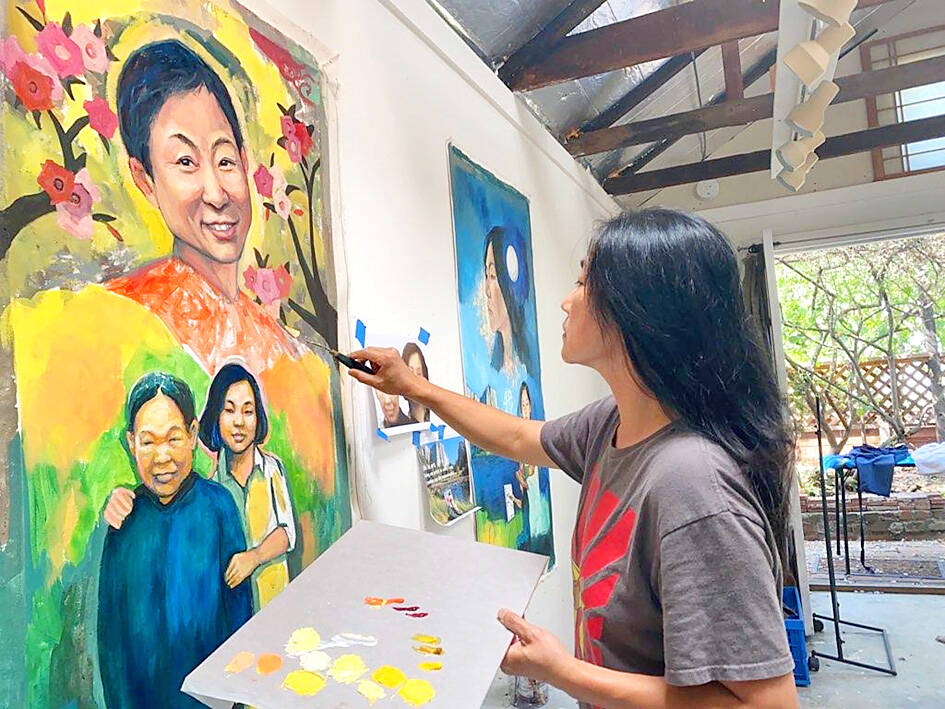Seventeen years after making San Francisco her home, Taiwanese painter Moo Tsung-wei (牟宗瑋) has not forgone her desire to speak for female immigrants in the US.
Moo’s drive to document life after emigration can be seen in the seven portraits of women from Taiwan, Canada, China, Haiti, India, Japan, Mexico and South Korea produced for an exhibition hosted by the San Francisco Public Library.
The subjects in Mothers and Daughters — Generations of Female Immigrants, which runs through March 30, are personally known to Moo, and include herself, as well as her mother and grandmother.

Photo courtesy of Moo Tsung-wei
Pointing to a portrait of her mother and grandmother in traditional garb, Moo said that the exhibition honors and acknowledges the contributions of female immigrants from different parts of the world to the US.
Since childhood, she has been deeply inspired by her mother and grandmother, both immigrants, Moo said, adding that their influence has led her art to frequently center on women.
“My grandma [came from such a poor family that she] wasn’t given a name. After World War II broke out, she fled Shandong Province in China to North Korea. She then escaped on foot to South Korea, where she gave birth to my mother,” Moo said.
Moo said that her mother, who moved to Taiwan as part of an arranged marriage, was the one who had encouraged her to pursue art in the US.
Moo, a former Taipei-based advertising art director, dedicated herself to creative pursuits, emigrating to San Francisco in 2005 and enrolling in fine art and ceramics courses in the city.
Moo’s artwork has been honored by a string of organizations, including the San Francisco Municipal Transportation Agency.
The seven portraits on display at the library are part of the San Francisco Arts Commission’s programs to support local artists.
“We believe it’s very important to bring all kinds of different stories to the library,” San Francisco Public Library director of communications Kate Patterson said.
“This particular body of work, which speaks so intimately of the immigrants’ experience and the generational experience of people who immigrated from other countries, is so important because so many people in San Francisco were not born in San Francisco, and came from other places and made this their home,” she said.
Moo said she spent the past three years working on paintings that aim to share the stories of immigrant women, and relay their courage and strength to the world, particularly amid a rise in hate crime against Asian-American women during the COVID-19 pandemic.
“Sometimes when I’m walking down the streets, people would yell at me for being Asian. During the COVID-19 pandemic, I would wear masks and sunglasses and cover my hair and even fingers when I go out,” Moo said.
“But then I would think to myself: Why do I need to live like this? Being an immigrant is a choice, not a mistake. And we make great contributions to society,” she said.
Talking about the future, Moo said she would continue to create, and make the voice of social justice and parity be heard across the globe.

Taiwan is to commence mass production of the Tien Kung (天弓, “Sky Bow”) III, IV and V missiles by the second quarter of this year if the legislature approves the government’s NT$1.25 trillion (US$39.78 billion) special defense budget, an official said yesterday. Commenting on condition of anonymity, a defense official with knowledge of the matter said that the advanced systems are expected to provide crucial capabilities against ballistic and cruise missiles for the proposed “T-Dome,” an advanced, multi-layered air defense network. The Tien Kung III is an air defense missile with a maximum interception altitude of 35km. The Tien Kung IV and V

The disruption of 941 flights in and out of Taiwan due to China’s large-scale military exercises was no accident, but rather the result of a “quasi-blockade” used to simulate creating the air and sea routes needed for an amphibious landing, a military expert said. The disruptions occurred on Tuesday and lasted about 10 hours as China conducted live-fire drills in the Taiwan Strait. The Civil Aviation Administration (CAA) said the exercises affected 857 international flights and 84 domestic flights, affecting more than 100,000 travelers. Su Tzu-yun (蘇紫雲), a research fellow at the government-sponsored Institute for National Defense and Security Research, said the air

A strong continental cold air mass is to bring pollutants to Taiwan from tomorrow, the Ministry of Environment said today, as it issued an “orange” air quality alert for most of the country. All of Taiwan except for Hualien and Taitung counties is to be under an “orange” air quality alert tomorrow, indicating air quality that is unhealthy for sensitive groups. In China, areas from Shandong to Shanghai have been enveloped in haze since Saturday, the ministry said in a news release. Yesterday, hourly concentrations of PM2.5 in these areas ranged from 65 to 160 micrograms per cubic meter (mg/m³), and pollutants were

Taiwan’s armed forces have established response protocols for a wide range of sudden contingencies, including the “Wan Chun Plan” to protect the head of state, the Ministry of Defense (MND) said today. After US President Donald Trump on Saturday launched a series of airstrikes in Venezuela and kidnapped Venezuelan President Nicolas Maduro, concerns have been raised as to whether China would launch a similar “decapitation strike” on Taiwan. The armed forces regularly coordinate with relevant agencies and practice drills to ensure preparedness for a wide range of scenarios, Vice Minister of National Defense Hsu Szu-chien (徐斯儉) told reporters before a